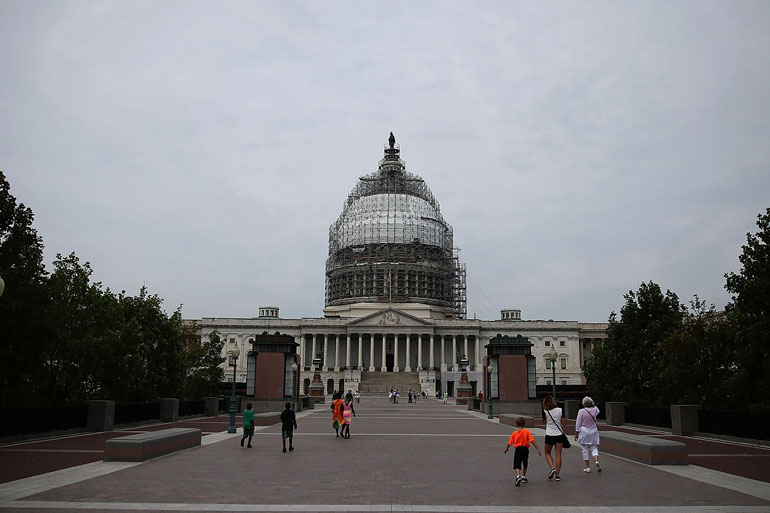Federal funding for Planned Parenthood will clearly be a flash point when Congress returns this week from its summer break.
But the fate of many other health programs, from the National Institutes of Health to efforts to reduce teen pregnancy, hang in the balance as well, as lawmakers decide whether and how to fund the government after the current fiscal year expires Sept. 30.
The Planned Parenthood fight could figure prominently in the coming legislative negotiation. Many GOP lawmakers, led by those running for president, have spent the summer pummeling the group for alleged mishandling of fetal tissue for research. They have vowed not to vote for any spending bill that allows federal funding for the organization, even if that means closing down the rest of the federal government. And that is despite the assertion last week from Senate Majority Leader Mitch McConnell, R-Ky., that there are not enough votes to approve defunding, given a likely veto from President Barack Obama.
But Planned Parenthood is not the only health program the GOP is targeting. The House Appropriations Committee earlier this summer approved a proposed spending bill for the Department of Health and Human Services that would eliminate all funding for the Title X federal family planning program, which mainly funds state and local health departments but also provides some of the federal funds Planned Parenthood receives. The House bill also zeroed out the Agency for Healthcare Research and Quality (AHRQ), which conducts and funds research on how health care is delivered and paid for. And while most of the Affordable Care Act can’t be fully defunded through the annual appropriations process, the bill also rescinded or transferred funds for the law’s implementation that it does control.
Dozens of other health programs were set for cuts as well. And a companion Senate spending bill, also approved at the committee level, included substantial, if not quite as large, cuts to many health programs, including those aimed at preventing teen pregnancy.
The reasons for the proposed cuts go beyond ideology. Automatic reductions in both defense and domestic spending that were triggered by a 2011 budget deal, known as the “sequester,” are driving total available spending down, in some cases by billions of dollars. And a bipartisan two-year deal to restore some of the cuts has now expired.
Neither of the spending bills approved by committees is likely headed for Obama’s desk. Instead, Congress is expected to pass what’s known as a “continuing resolution,” or CR, to keep the government open – assuming Republicans can muster the votes. Spending levels in a CR are normally based on the previous year’s amounts.
A CR can be good or bad, says Emily Holubowich, executive director of the Coalition for Health Funding, depending on how the program would have fared under the proposed spending bills. “If you’re AHRQ, flat funding is better than zero,” she said. “But if you’re [NIH], you’re giving up a $1 billion increase.” Both the House and Senate bills proposed large increases for the NIH, one of the few programs in line for a spending boost.
The coalition advocates for health spending as a whole, to prevent groups from trying to gain funding for some programs at other health programs’ expense.
But pitting programs against each other is exactly what the GOP’s proposed bills aimed to do, says Rep. Rosa DeLauro, D-Conn., the lead Democrat on the subcommittee that oversees HHS funding.
“I think what they have done is look at where they could score points – which is with NIH,” DeLauro said. Republicans have traditionally supported more funding for biomedical research, which is popular with the public. “But everything else has taken a hit,” she said.
Even supporters of biomedical research weren’t happy with the idea of those increases coming at the expense of other health programs. “We’re no fans of that kind of rob Peter to pay Paul,” said Mary Woolley, president of the advocacy group Research!America. Rather, says Woolley, “Best case scenario, we find a way around sequestration.”
That’s something the Obama administration wants, too. “Sequestration was never supposed to take effect,” Office of Management and Budget Director Shaun Donovan wrote in a letter to the authors of the House spending bill. “Rather, it was supposed to threaten such drastic cuts to both defense and non-defense funding that policymakers would be motivated to come to the table and reduce the deficit through smart, balanced reforms.”
But even those closest to the process wonder if it is possible to negotiate a solution given hot button issues like the health law and Planned Parenthood, as well as the fact that the presidential race is heating up.
“I’d like to believe they’re going to figure this out, but I just don’t know,” said Holubowich, whose group is preparing to blanket Capitol Hill with baseball hats emblazoned with “Raise the Caps.”
Loren Adler of the anti-deficit Committee for a Responsible Federal Budget agrees with that assessment. “It’s very unclear exactly where lawmakers are right now,” he said, in terms of either their desire to keep the government open through a short-term funding extension or negotiating changes to the spending caps. “I’m just hoping they don’t push it out to Christmas this year.”








